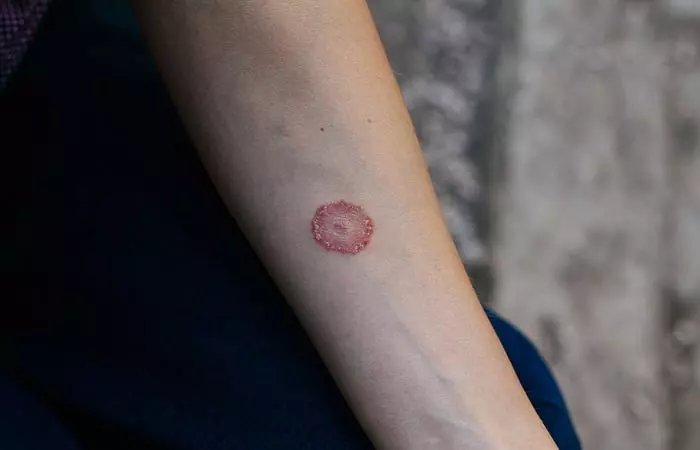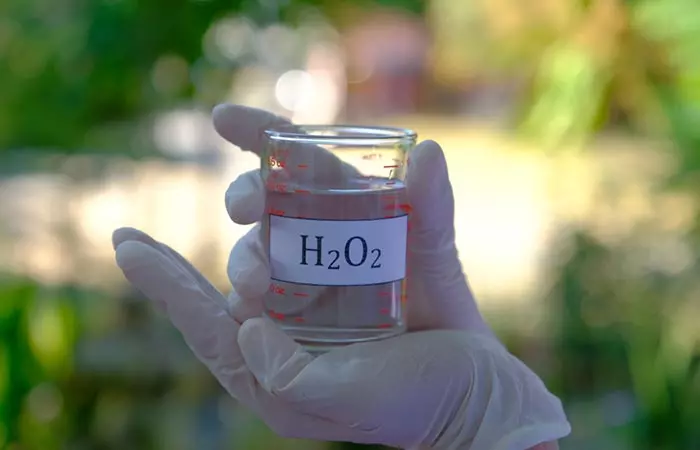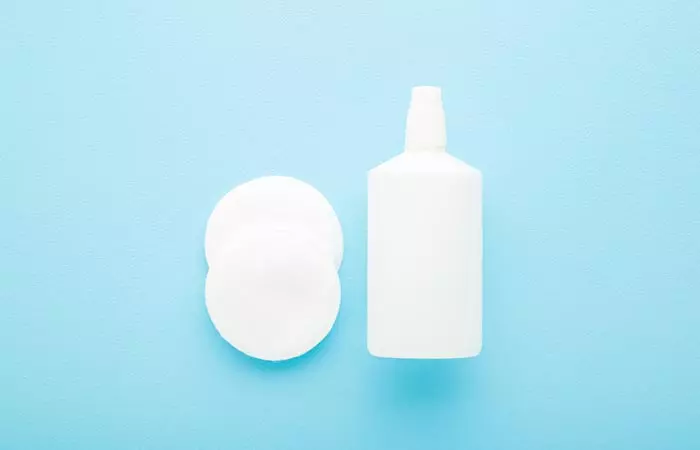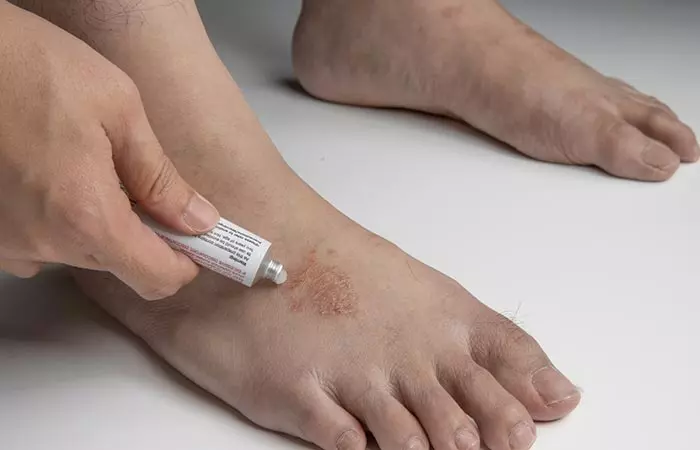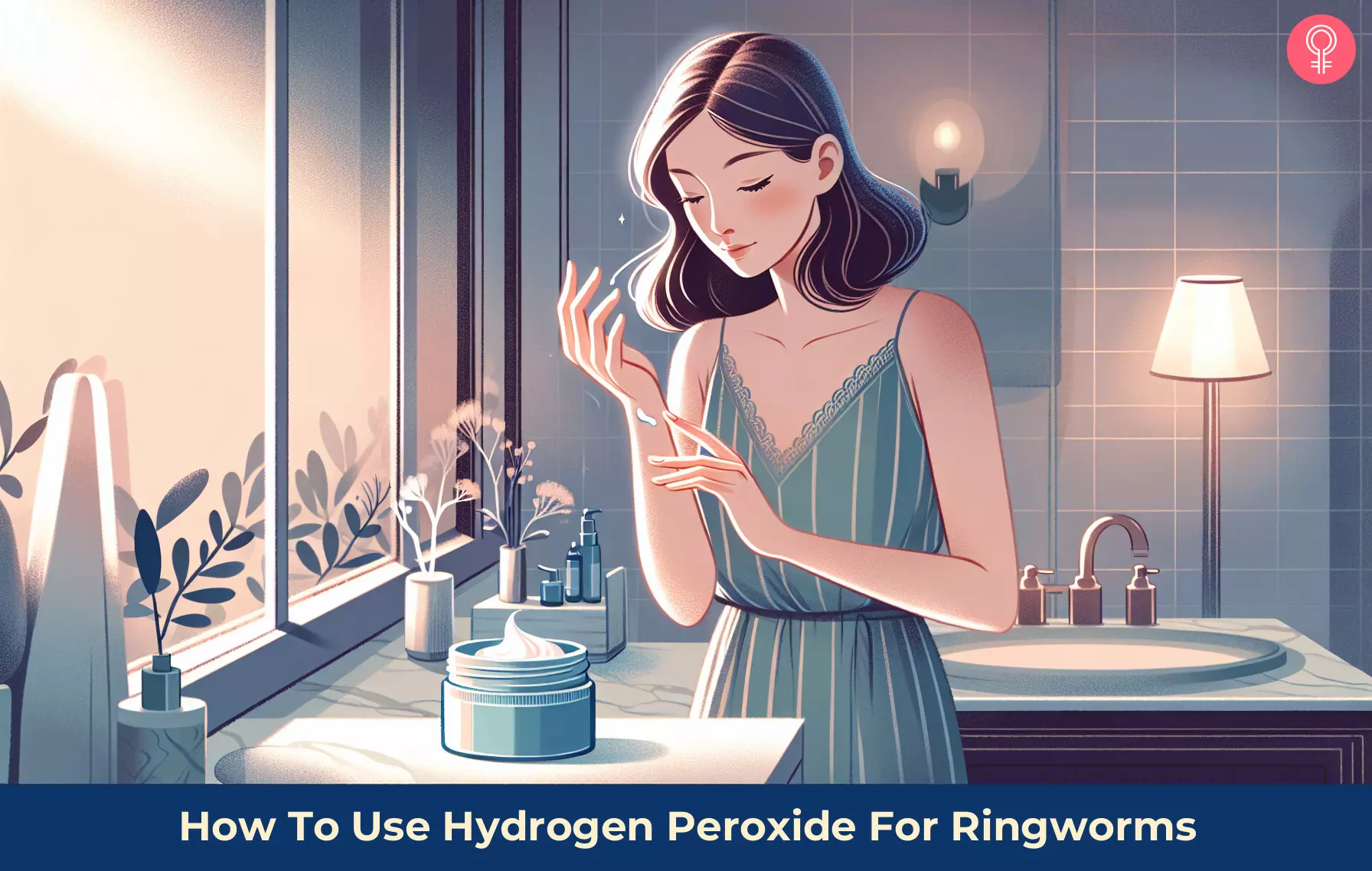What Is A Ringworm Infection?
Dermatophytosis, which is commonly known as ringworm, is a fungal infection. It affects various parts of the body, such as the scalp, legs, toenails, and fingernails (1). Ringworm is a contagious infection and can spread easily from person to person. In some cases, ringworm infection can be contracted from animals. Domestic pets, like cats, dogs, or guinea pigs, can be carriers of this infection (2). A research study conducted on 4,156 US adults found that 114 participants (2.7%) reported having a ringworm infection, 415 (10.0%) revealed having a fungal nail infection, and 37 reported both in the past year. Male participants had a ringworm infection more often than female participants (64.0% vs. 48.2%). After contracting the infection, one can spot red and itchy spots on their skin. These patches are ring-like in appearance. Scratching is not the best solution as it can cause the infection to spread. If this infection is not treated in the first instance, it can recur. This is where hydrogen peroxide can help.
Does Hydrogen Peroxide Kill Fungus?
Hydrogen peroxide has antibacterial, fungicidal, and sporicidal properties (3). These properties may help in disinfecting the affected area and preventing the spread of infection. So, if you are looking for some home remedies for ringworm, hydrogen peroxide may help in eliminating ringworm infection with regular use. The treatment period may vary depending on the severity of the case.
How To Use Hydrogen Peroxide To Treat Ringworms
As mentioned earlier, hydrogen peroxide is a readily available formulation. You may easily procure it from a local chemist. It is also an inexpensive yet effective method that may treat ringworm infection. A visit to your nearest chemist will show you that hydrogen peroxide is available in varying strengths. For treating ringworms, however, you may need to use a 3% solution. Dr. Farnsworth adds, “Hydrogen peroxide is toxic to bacteria and fungi, but also to normal skin cells. The prevailing recommendations are to only use hydrogen peroxide to clean out wounds with dirt or other debris in them, or to help remove dried blood. But even then, it should be diluted 1:1 with clean tap water. Full-strength or consistent use of peroxide can actually delay healing by killing the cells trying to heal a wound.” To administer hydrogen peroxide, you will need a sterile cotton ball. Dilute the solution according to the sensitivity of your skin. Consult your doctor to know how much you need to dilute the solution. Soak a cotton ball in the diluted solution. Apply this to the infected area and leave it on for a while. You may do this a few times daily until you see the ringworm infection subside. He adds, “Rubbing alcohol strips the skin of its natural protective lipid barrier, leaving the skin dry, cracked, and ironically more susceptible to infection. Large and prolonged exposures can also permit systemic absorption, which is particularly dangerous with isopropyl alcohol.” Note: Hydrogen peroxide may cause slight skin irritation. It may also cause a stinging sensation on the surface of your skin. If you have sensitive skin, you might experience slight discomfort. In some cases, using a higher quantity of the solution may cause the skin in the affected area to go a little white for a short while. So, always do a patch test to check for sensitivities and consult your doctor if you experience persistent skin irritation. Let’s explore some alternative remedies that might be used to treat and cure the issue of ringworm.
Does Neosporin Help With Ringworm?
Neosporin is an antibiotic ointment that is used to treat minor skin injuries. Although there is no significant research connecting neosporin to the treatment of ringworm, it is believed that neosporin might help control the ringworm infection at an early stage. Apart from Neosporin, you can use Miconazole, another antifungal medication to treat ringworm (5).
Other Alternatives For Treating Ringworm
Use an antifungal shampoo to clean out your scalp thoroughly (6). Clean your hands and fingernails thoroughly with antibacterial soap. If you have contracted an infection, let the infected area breathe by not covering it up with tight clothing. Make sure to keep your bed covers washed and cleaned. Take a shower after your gymming or workout sessions. Do not share clothes, towels, or bed sheets with the infected person. Change your socks and underwear daily. Put on socks only after washing your feet and drying them completely. You can use a prescription antifungal ointment, cream, or lotion (7).
Dr. Farnsworth adds, “For those looking for a home remedy for ringworm, diluted white vinegar is often promoted as a nonspecific antimicrobial and anti-inflammatory agent. White or apple cider vinegar typically comes in a concentration of 4%-7% acetic acid, with higher concentrations exclusively reserved for household cleaning or agricultural uses. When 4%-7% vinegar is diluted with 4-6 parts tap water, it can have both antimicrobial and anti-inflammatory effects with little risk of damage to the skin, but responses are not terribly consistent or reliable.” Scroll down to learn about the medical treatments your doctor may recommend to treat a ringworm infection.
Medical Treatment For Ringworm
Some of the commonly listed medical treatment for ringworm include (9): As you know it is always best to prevent a condition than treat it, here are a few tips to be on the safe side.
Prevention Strategies For Ringworms
Follow the preventive measures below to keep ringworms at bay.
Keep your skin clean and dry, especially in areas prone to sweating. Avoid sharing personal items like towels, clothes, or combs. Wear breathable fabrics to reduce sweating. Wash hands regularly, especially after touching animals or affected areas. Treat pets for ringworm if they show symptoms. Use antifungal powders or creams if you are prone to ringworm.
Is hydrogen peroxide harmful to the skin? Read the infographic below to learn how to apply hydrogen peroxide to your skin.Illustration: StyleCraze Design Team Yes. Hydrogen peroxide can be harmful to the skin in higher concentrations, causing irritation, blistering, and burning. Will hydrogen peroxide stop itching? Anecdotal evidence suggests that it can help soothe itching due to insect bites, skin infections, etc. if used in the recommended dosages. Can you bathe in hydrogen peroxide? Yes. You can prepare a hydrogen peroxide bath by mixing it with water in safe concentrations.
Illustration: How To Use Hydrogen Peroxide For Ringworms
Discover expert tips on preventing and treating ringworm rash in this informative video. Arm yourself with seven effective strategies for a healthier, ringworm-free life by clicking on this video.
